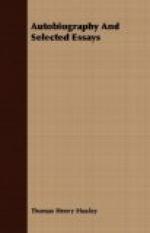From the point of view of subject-matter, structure, and style, Huxley’s essays are admirably adapted to the uses of the student in English. The themes of the essays are two, education and science. In these two subjects Huxley earnestly sought to arouse interest and to impart knowledge, because he believed that intelligence in these matters is essential for the advancement of the race in strength and morality. Both subjects, therefore, should be valuable to the student. In education, certainly, he should be interested, since it is his main occupation, if not his chief concern. Essays like A Liberal Education and The Principal Subjects of Education may suggest to him the meaning of all his work, and may suggest, also, the things which it would be well for him to know; and, even more, a consideration of these subjects may arouse him to a greater interest and responsibility than he usually assumes toward his own mental equipment. Of greater interest probably will be the subjects which deal with nature; for the ways of nature are more nearly within the range of his real concerns than are the wherefores of study. The story of the formation of a piece of chalk, the substance which lies at the basis of all life, the habits of sea animals, are all subjects the nature of which is akin to his own eager interest in the world.
Undoubtedly the subjects about which Huxley writes will “appeal” to the student; but it is in analysis that the real discipline lies. For analysis Huxley’s essays are excellent. They illustrate “the clear power of exposition,” and such power is, as Huxley wrote to Tyndall, the one quality the people want,—exposition “so clear that they may think they understand even if they don’t.” Huxley obtains that perfect clearness in his own work by simple definition, by keeping steadily before his audience his intention, and by making plain throughout his lecture a well-defined organic structure. No X-ray machine is needful to make the skeleton visible; it stands forth with the parts all nicely related and compactly joined. In reference to structure, his son and biographer writes, “He loved to visualize his object clearly. The framework of what he wished to say would always be drawn out first.” Professor Ray Lankester also mentions Huxley’s love of form. “He deals with form not only as a mechanical engineer in partibus (Huxley’s own description of himself), but also as an artist, a born lover of form, a character which others recognize in him though he does not himself set it down in his analysis.” Huxley’s own account of his efforts to shape his work is suggestive. “The fact is that I have a great love and respect for my native tongue, and take great pains to use it properly. Sometimes I write essays half-a-dozen times before I can get them into proper shape; and I believe I become more fastidious as I grow older.” And, indeed, there is a marked difference in firmness of structure between the earlier essays, such as On the Educational Value of the Natural History Sciences, written, as Huxley acknowledges, in great haste, and the later essays, such as A Liberal Education and The Method of Scientific Investigation. To trace and to define this difference will be most helpful to the student who is building up a knowledge of structure for his own use.




